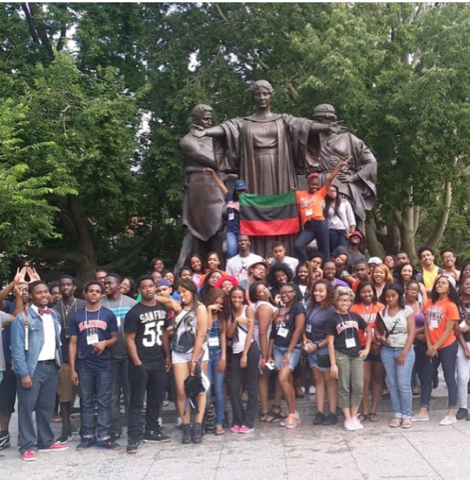Organization aims for 100 percent African-American student retention at the University

100 Strong, a retention program created by the Bruce D. Nesbitt African American Cultural Center, works closely with freshmen to help them feel at home on campus.
August 17, 2015
At a campus where only 4.9 percent of the total student population is African American according to the University’s Division of Management Information, the first year of college can be overwhelming and challenging for an African-American student.
That’s why the Bruce D. Nesbitt African American Cultural Center developed a retention program known as 100 Strong, which aims to support African-American students at the University, specifically freshmen, by assisting them academically through connection and involvement in campus resources.
In 2006, the BNAAC’s former Director Nathaniel Banks and Assistant Director Nameka Bates helped develop 100 Strong.
According to the Office of Inclusion and Intercultural Relations website, one of the program’s goals was to help share knowledge with African-American students on how to collaborate together as well as build a sense of community on campus.
Deneen Holmes, senior in AHS, started as a mentee before becoming this year’s intern and president of 100 Strong.
Get The Daily Illini in your inbox!
She said the “100 percent” retention rate for African-American students is one of the fundamental goals of the organization.
She also highlighted how the familial tone of the organization is what provides the organization with strength.
“Because we pride ourselves on being a family, we act as that support system from a home away from home,” Holmes said. “For you to know that other African-American students are succeeding and they want you to succeed, it’s a motivation; it’s inspiring because you’re just like, ‘They did it, so I can do it, too.’”
Every summer, the director of BNAAC collects all of the demographics of the University’s incoming freshmen and sends an email about the program to those that identified themselves as African-American or black.
Bitanya Gebrekristos, sophomore in ACES, recalled feeling nervous and lost when she first moved to campus.
She said signing up for 100 Strong really helped her transition smoothly onto a campus filled with students with social identities and cultures different from her own.
“Just seeing the group leaders, how they went out of their way to make sure that you felt loved and welcomed and just at peace on campus,” Gebrekristos said. “It just made me realize that I have a family on campus.”
After joining 100 Strong, Gebrekristos decided to run for a leadership role and was elected as this year’s Outreach and Recruitment Chair.
Gebrekristos said freshmen who join 100 Strong create a bond with fellow members and are reassured that they’re not alone in their struggles.
“They will always have a family with us, no matter where they go, what clubs they join — they can always come to the African-American Cultural Center, kick back and just be surrounded by people that they know,” Gebrekristos said. “Every one of us had to go through that experience of being lost and being scared of not knowing what to do.”
Though students can apply for 100 Strong at any time throughout the academic year, this year the first 100 African-American students who signed up for the program had the opportunity to move to campus early.
On Tuesday, the 100 Strong group leaders acted as I-Guides for the early movers and helped them move into their residence halls.
From there, freshmen partook in a retreat planned by 100 Strong where they could tour campus and visit different resources including The Career Center and the Illini Union Bookstore. The students also participated in team-building exercises.
In addition to the several events and retreats the organization hosts throughout the year, Holmes said 100 Strong also has discussions called “Hot Topics” every Thursday of the month.
“We base our topics on what is going on throughout the school year — so around finals we do stress management, study skills tips for them,” Holmes said. “We have check-in sessions where the freshmen would come in the black house and we would talk about what’s going on, to see if everything is OK.”
African-American upperclassmen can still be members of the organization and sign up to be mentors, giving freshmen social, emotional and academic support.
Dashawn Julion, junior in LAS, is one of the group leaders for 100 Strong this year.
He said there’s a new opportunity for 100 Strong’s sophomore members to get involved in this year.
“We also started a pilot program for African-American sophomore students that were recent 100 Strong freshmen,” Julion said. “It’s basically a way for (the sophomores) to stay connected with 100 Strong and their mentors and continue their education, as well as help other freshmen out. So we kind of want to keep the (involvement) going throughout their years at the University.”
Every year, the organization hosts an event for new African-American students called Wake-Up Call.
First year and transfer students have the chance to be introduced and get to know all of the RSOs and campus organizations that are mainly geared toward African-American students.
This year’s event will be held on Saturday at 5 p.m. in Lincoln Hall.
“Each year, the freshmen students are different,” Holmes said. “So because we haven’t met them yet, we don’t really know what their needs are. We gear our programs toward what they need as individuals.”
However, Holmes said the organization always has one significant goal in mind for every 100 Strong member.
“You might be one fish in a big pond, but you can still be successful,” Holmes said. “You can have the resources, you can have the support system to graduate. We just want you to take the initiative to do it.”
Tweet: 100 Strong is a retention program aimed toward African-American students at the University.






